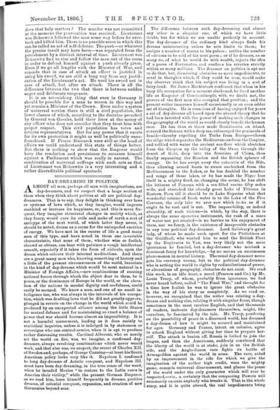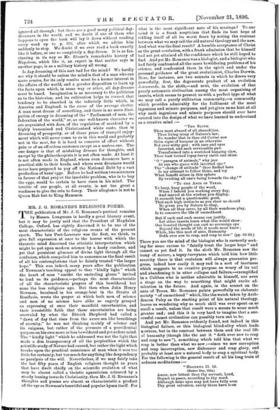DAY-DREAMING IN POLITICS.
ALMOST all men, perhaps all men with imaginations, are day-dreamers, and we suspect that a large section of them when they think about politics at all are political day- dreamers. That is to say, they delight in thinking over laws or systems of laws which, as they imagine, would improve mankind or increase its happiness, or, and this is more fre- quent, they imagine structural changes in society which, as they fancy, would cure its evils and make of earth .a sort of antitype of the next world, of which latter they never, it should be noted, dream as a scene for the unimpeded exertion of energy. We have met in the course of life a good many men of this type, and have noted in them one invariable characteristic, that none of them, whether wise or foolish, shrewd or obtuse, can bear with patience a rough intellectual assault, especially if it takes the form of ridicule, upon the dream which colours their internal meditations. And there are a great many men who, knowing something of history and a little of the present circumstances of the world, luxuriate in the kind of day-dreams which would be most natural in a Minister of Foreign Affairs,—new combinations of existing national forces through which the object dear to them, be it peace, or the dominance of Europe in the world, or the eleva- tion of the nations in mental dignity and usefulness, could easily be secured. We know a man, and one of no small in- telligence too, who was always in the intervals of his occupa- tion, which was drafting laws that he did not greatly approve, plunged in reverie on the change in the world which could be produced by an unexpected alliance among the little States for mutual defence and for maintaining so exact a balance of power that war should become almost an impossibility. It is not a harmful amusement, leading as it does mainly to statistical inquiries, unless it is indulged in by statesmen or sovereigns who can control armies, when it is apt to produce rather distressing results. Cardinal Alberoni, who so nearly set the world on fire, was, we imagine, a confirmed day- dreamer, always revolving combinations which never would work, and that also was, we suspect, the secret of Charles XII. of Sweden and, perhaps, of George Canning—at least his South American policy looks very like it. Napoleon L confessed to long day-dreams of Asiatic conquest, and Napoleon III. must have been day-dreaming, in the true sense of the word, when he invaded Mexico " to restore to the Latin races in America their virility," while the present German Emperor, as we read him, loses himself frequently in dreams, positive dreams, of colonial conquest, expansion, and creation of new Germanies beyond seas. The difference between such day-dreaming and almost any other is a singular one, of which we have little doubt, but for which we are unable perfectly to account. The day-dreamer of the ordinary kind always finds his dreams uninteresting unless he sets limits to them; he assigns a number of rooms to his palace ; settles the number of editions to be sold of his next poem ; or if he dreams, as so many do, of what he would do with wealth, rejects the idea of a purse of Fortnnatus, and confines his reveries strictly within so many millions. The dreamer on politics is apt not to do that, but, dismissing obstacles as mere impediments, to revel in thoughts which, if they could be seen, would make the observer think that his subject was living in a sort of fairy-land. Sir James Mackintosh confessed that when in his• busy life occupation for a moment slackened, he lived another life as Emperor of Constantinople, with, we doubt not, the powers of the first man who occupied that position ; and the present writer immerses himself occasionally in an even odder set of thoughts. He is conscious of having enjoyed for years a set of day-dreams all based upon the absurd theory that he had been invested with the power of making such changes in the geography of the world as would clearly benefit the human race. He has thus at times made Scandinavia an island, covered the Sahara with a deep sea, submerged the peninsula of Ismid—thereby expelling the Turks from Europe—cloven the ridge which separates the Mediterranean from the Caspian, and refilled with water the ancient sea-floor which stretches from the Caspian up the valley of the thus, through the desert of Gobi, deep into the frontiers of China, thus finally separating the Russian and the British spheres of energy. Or he has swept away the cataracts of the Nile, thus allowing armed boats to steam unchecked from the Mediterranean to the Lakes, or he has doubled the number and range of those lakes, or he has made the Nigc... lose itself in a mighty fiord, or, changing the scene, he has cleft the isthmus of Panama with a sea-filled ravine fifty miles wide, and stretched the already great Lake of Titicaca in Eastern Pert' till it should be to Lake Superior what that wonderful volume of fresh water is to the Lake of the Five Cantons, the only lake we ever saw which looks as if it ought to be vast and is not. The impossibility, or indeed' absurdity, of such visions—in which, by the way, there is always the same operative instrument, the rush of a mass of water not yet created—is no barrier to his enjoyment of them, nor we fancy, is the existence of insuperable obstacles to any true political day-dreamer. Lord Salisbury's great lady, of whom he made such sport for the Philistines at the Guildhall, who wanted him to send the British Fleet up the Euphrates to Van, was very likely not the mere ignoramus he fancied, but a day-dreamer who mistook a dominant fancy for knowledge,—by no means an uncommon. phenomenon in mental history. The usual day-dreamer never gets his currency wrong, but to the political day-dreamer who is setting the world to rights by redistributions of power, or alterations of geography, obstacles do not exist. We read this week, in an idle hour, a novel (Pearson and Co.) by Mr. Louis Tracy, of whom, probably from ignorance, we bad never heard before, called "The Final War," and thought for a time how foolish he was to ignore the great obstacles in the way of his story so completely. As we read on, however, we recognised that the writer was relating a day- dream and nothing else, relating it with singular force, though sometimes in the most careless English, and that thousands of readers, inchoate day-dreamers themselves, might, like ourselves, be fascinated by the tale. Mr. Tracy, pondering on the possibility of peace in a disarmed world, has dreamed a day-dream of how it might be secured and maintained for ages. Germany and France, intent on colonies, agree to attack England without giving her time to prepare her- self. The attack is beaten off, Russia is bribed to join the league, and then the Americans, suddenly convinced that the liberty of the world is at stake, join in on the British side, and the Anglo-Saxon race fights its battle of Armageddon against the world in arms. The race, aided by an improvement in the rifle for which we give the imagination of the author high credit, wins the mighty game, compels universal disarmament, and places the pew of the world under the only guarantee which will ever be respected,—viz., a certainty that the conquering Powers will summarily execute anybody who breaks it. That is the whole story, and it is quite absurd, the real impediments being
ignored all through ; but there are a good many political day- dreamers in the world, and we doubt if one of them who happens to open the book will lay it down without reading every word up to p. 360, after which we advise him suddenly to stop. We doubt if we ever read a book exactly like it before, or one so completely a day-dream. It is as fas- cinating in its way as Mr. Sloane's remarkable history of Napoleon, which like it, an expert in that matter says in another page, is as a military history all wrong.
Is day-dreaming of this sort bad for the mind P We hardly see why it should be unless the mind is that of a man who can move armies, for its only results must be a keener interest in the affairs of the world, and a greater disposition to learn up the facts upon which, in some way or other, all day-dreams must be based. Imagination is as necessary to the politician as to the historian, and its cultivation helps to correct that tendency to be absorbed in the infinitely little which, in America and England, is the curse of the average elector. A man must dream of something, and there is no more dissi- pation of energy in dreaming of the " Parliament of man, the federation of the world," or, as one well-known character we are acquainted with does, of the regulation of mankind by a highly humanised and Christianised white caste, than in dreaming of prosperity, or of those years of tranquil enjoy- ment which will never come to us in this world and probably not in the next, for it is bard to conceive of effort without pain or of an effortless existence except as a useless one. The one danger is that of mistaking dreams for thoughts, and except-by the philanthropists it is not often made. At least it is not often made in England, where even dreamers have a practical side to their heads, and where even dreamers would never have proposed to pay off the National Debt by a vast production of hens' eggs. Before he had written two sentences in favour of that project the insoluble problem, who is to buy the eggs, would be certain to have risen in his mind. The trouble of our people, at all events, is not too great a readiness to give the rein to fancy. Their allegiance is not to Queen Mab but to King Mammon.























































 Previous page
Previous page